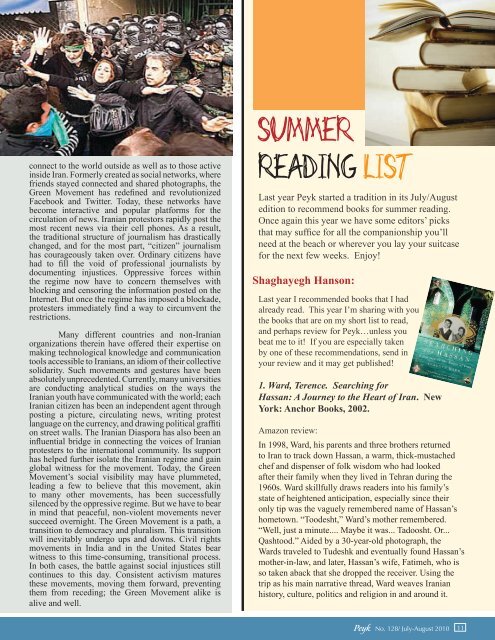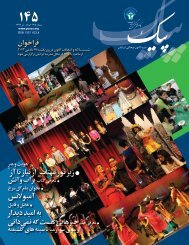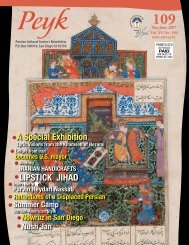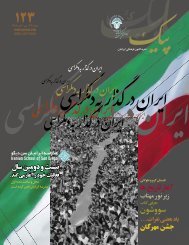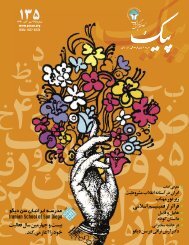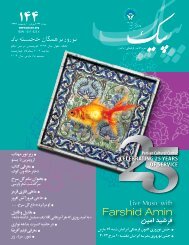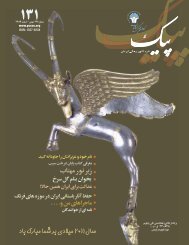English Section - Persian Cultural Center
English Section - Persian Cultural Center
English Section - Persian Cultural Center
You also want an ePaper? Increase the reach of your titles
YUMPU automatically turns print PDFs into web optimized ePapers that Google loves.
SUMMER<br />
connect to the world outside as well as to those active<br />
inside Iran. Formerly created as social networks, where<br />
friends stayed connected and shared photographs, the<br />
Green Movement has redefined and revolutionized<br />
Facebook and Twitter. Today, these networks have<br />
become interactive and popular platforms for the<br />
circulation of news. Iranian protestors rapidly post the<br />
most recent news via their cell phones. As a result,<br />
the traditional structure of journalism has drastically<br />
changed, and for the most part, “citizen” journalism<br />
has courageously taken over. Ordinary citizens have<br />
had to fill the void of professional journalists by<br />
documenting injustices. Oppressive forces within<br />
the regime now have to concern themselves with<br />
blocking and censoring the information posted on the<br />
Internet. But once the regime has imposed a blockade,<br />
protesters immediately find a way to circumvent the<br />
restrictions.<br />
Many different countries and non-Iranian<br />
organizations therein have offered their expertise on<br />
making technological knowledge and communication<br />
tools accessible to Iranians, an idiom of their collective<br />
solidarity. Such movements and gestures have been<br />
absolutely unprecedented. Currently, many universities<br />
are conducting analytical studies on the ways the<br />
Iranian youth have communicated with the world; each<br />
Iranian citizen has been an independent agent through<br />
posting a picture, circulating news, writing protest<br />
language on the currency, and drawing political graffiti<br />
on street walls. The Iranian Diaspora has also been an<br />
influential bridge in connecting the voices of Iranian<br />
protesters to the international community. Its support<br />
has helped further isolate the Iranian regime and gain<br />
global witness for the movement. Today, the Green<br />
Movement’s social visibility may have plummeted,<br />
leading a few to believe that this movement, akin<br />
to many other movements, has been successfully<br />
silenced by the oppressive regime. But we have to bear<br />
in mind that peaceful, non-violent movements never<br />
succeed overnight. The Green Movement is a path, a<br />
transition to democracy and pluralism. This transition<br />
will inevitably undergo ups and downs. Civil rights<br />
movements in India and in the United States bear<br />
witness to this time-consuming, transitional process.<br />
In both cases, the battle against social injustices still<br />
continues to this day. Consistent activism matures<br />
these movements, moving them forward, preventing<br />
them from receding; the Green Movement alike is<br />
alive and well.<br />
READING LIST<br />
Last year Peyk started a tradition in its July/August<br />
edition to recommend books for summer reading.<br />
Once again this year we have some editors’ picks<br />
that may suffice for all the companionship you’ll<br />
need at the beach or wherever you lay your suitcase<br />
for the next few weeks. Enjoy!<br />
Shaghayegh Hanson:<br />
Last year I recommended books that I had<br />
already read. This year I’m sharing with you<br />
the books that are on my short list to read,<br />
and perhaps review for Peyk…unless you<br />
beat me to it! If you are especially taken<br />
by one of these recommendations, send in<br />
your review and it may get published!<br />
1. Ward, Terence. Searching for<br />
Hassan: A Journey to the Heart of Iran. New<br />
York: Anchor Books, 2002.<br />
Amazon review:<br />
In 1998, Ward, his parents and three brothers returned<br />
to Iran to track down Hassan, a warm, thick-mustached<br />
chef and dispenser of folk wisdom who had looked<br />
after their family when they lived in Tehran during the<br />
1960s. Ward skillfully draws readers into his family’s<br />
state of heightened anticipation, especially since their<br />
only tip was the vaguely remembered name of Hassan’s<br />
hometown. “Toodesht,” Ward’s mother remembered.<br />
“Well, just a minute.... Maybe it was... Tadoosht. Or...<br />
Qashtood.” Aided by a 30-year-old photograph, the<br />
Wards traveled to Tudeshk and eventually found Hassan’s<br />
mother-in-law, and later, Hassan’s wife, Fatimeh, who is<br />
so taken aback that she dropped the receiver. Using the<br />
trip as his main narrative thread, Ward weaves Iranian<br />
history, culture, politics and religion in and around it.<br />
No. 128/ July-August 2010 11


